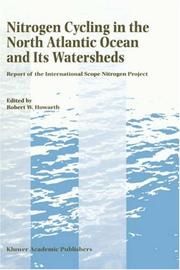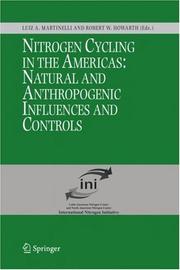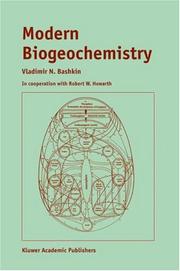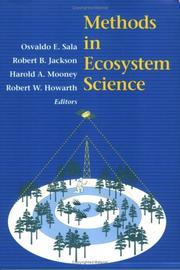| Listing 1 - 10 of 14 | << page >> |
Sort by
|
Book
Year: 1966 Publisher: London: Dent,
Abstract | Keywords | Export | Availability | Bookmark
 Loading...
Loading...Choose an application
- Reference Manager
- EndNote
- RefWorks (Direct export to RefWorks)

ISBN: 079234281X Year: 1996 Publisher: Dordrecht ; Norwell, MA : Kluwer,
Abstract | Keywords | Export | Availability | Bookmark
 Loading...
Loading...Choose an application
- Reference Manager
- EndNote
- RefWorks (Direct export to RefWorks)
Denitrification (biological) --- Nitrogen cycle --- Surface waters --- Mer

ISBN: 1280745029 9786610745029 140205517X 1402047177 9048171784 Year: 2006 Publisher: Dordrecht : Springer,
Abstract | Keywords | Export | Availability | Bookmark
 Loading...
Loading...Choose an application
- Reference Manager
- EndNote
- RefWorks (Direct export to RefWorks)
The rate of creation of reactive nitrogen (NR) on the earth has dramatically increased in the last half century mainly due to the production of N-fertilizer through the Haber-Bosch process, fossil fuel combustion, and the cultivation of plants that fix N from the atmosphere. The anthropogenic production of NR has been especially high in developed countries of the temperate zone, such as the USA and Canada, where severe eutrophication of estuaries and coastal zones, acidification of lakes and streams, loss of biodiversity, and reduced forest productivity have become common environmental problems associated with increasing nitrogen loads to ecosystems. However, important drivers responsible for the increase of the production of NR in the temperate zone are increasingly influencing the nitrogen cycle in rapidly developing regions of the world, such as the Tropics and Sub-Tropics, including most of the countries of Latin America and the Caribbean. Advances in our understanding of the nitrogen cycle and the impact of anthropogenic activities on regional to global scales depend on the expansion of scientific studies to these fast-developing regions. This book presents a series of studies from across the Americas whose aim is to highlight key natural processes that control nitrogen cycling as well as discuss the main anthropogenic influences on the nitrogen cycle in both the tropical and temperate regions of the Americas.
Nitrogen cycle. --- Nutrient pollution of water. --- Lakes --- Nutrient pollution of rivers, lakes, etc. --- Rivers --- Water --- Biogeochemical cycles --- Nutrient pollution --- Pollution --- Ecology. --- Endangered ecosystems. --- Environmental toxicology. --- Ecosystems. --- Biogeosciences. --- Ecotoxicology. --- Ecotoxicology --- Pollutants --- Environmental health --- Toxicology --- Threatened ecosystems --- Biotic communities --- Nature conservation --- Balance of nature --- Biology --- Bionomics --- Ecological processes --- Ecological science --- Ecological sciences --- Environment --- Environmental biology --- Oecology --- Environmental sciences --- Population biology --- Ecology --- Ecology . --- Geobiology. --- Earth sciences --- Biosphere --- Biocenoses --- Biocoenoses --- Biogeoecology --- Biological communities --- Biomes --- Biotic community ecology --- Communities, Biotic --- Community ecology, Biotic --- Ecological communities --- Ecosystems --- Natural communities
Book
ISBN: 0306481030 Year: 2002 Publisher: Dordrecht ; Boston : Kluwer Academic Publishers,
Abstract | Keywords | Export | Availability | Bookmark
 Loading...
Loading...Choose an application
- Reference Manager
- EndNote
- RefWorks (Direct export to RefWorks)
Modern Biogeochemistry is aimed to generalize modern ideas of biogeochemical developments during the last decades. It is designed to support a general course in biogeochemistry, and as such, is likely to have a broad market among the many universities and colleges that are adding such courses to their curricula. This book aims to supplement the existing textbooks by providing modern understanding of biogeochemistry, from evolutionary biogeochemistry to practical applications of biogeochemical ideas such as human biogeochemistry, biogeochemical standards and biogeochemical technologies. To a certain extent this textbook is a summary of both scientific results of various authors and classes in biogeochemistry, that have been given to students by authors during the last 5 to 10 years at different universities throughout the world such as Cornell, Moscow, Seoul and Bangkok. Biogeochemistry is becoming an increasingly popular subject for graduate and postgraduate education. Courses in ecology, geography, biology, chemistry, environmental science, public health and environmental engineering all tend to have a biogeochemical component in their syllabuses to a greater or lesser extent.
Earth sciences. --- Physical chemistry. --- Geochemistry. --- Public health. --- Ecology. --- Earth Sciences. --- Physical Chemistry. --- Public Health. --- Ecology . --- Community health --- Health services --- Hygiene, Public --- Hygiene, Social --- Public health services --- Public hygiene --- Social hygiene --- Health --- Human services --- Biosecurity --- Health literacy --- Medicine, Preventive --- National health services --- Sanitation --- Balance of nature --- Biology --- Bionomics --- Ecological processes --- Ecological science --- Ecological sciences --- Environment --- Environmental biology --- Oecology --- Environmental sciences --- Population biology --- Chemistry, Theoretical --- Physical chemistry --- Theoretical chemistry --- Chemistry --- Chemical composition of the earth --- Chemical geology --- Geological chemistry --- Geology, Chemical --- Earth sciences --- Ecology --- Biogeochemistry. --- Biogeochemical cycles. --- Biogeochemistry --- Cycles --- Biochemistry --- Geochemistry
Digital
ISBN: 9781402055171 Year: 2006 Publisher: Dordrecht Springer
Abstract | Keywords | Export | Availability | Bookmark
 Loading...
Loading...Choose an application
- Reference Manager
- EndNote
- RefWorks (Direct export to RefWorks)
Biogeography --- General ecology and biosociology --- Environmental protection. Environmental technology --- biogeografie --- milieuzorg --- milieubeheer --- ecosystemen --- milieuanalyse

ISBN: 1402009925 1402009941 Year: 2002 Publisher: Dordrecht : Kluwer,
Abstract | Keywords | Export | Availability | Bookmark
 Loading...
Loading...Choose an application
- Reference Manager
- EndNote
- RefWorks (Direct export to RefWorks)
Book
ISBN: 9780470909133 0470909137 Year: 2014 Publisher: Hoboken: Wiley,
Abstract | Keywords | Export | Availability | Bookmark
 Loading...
Loading...Choose an application
- Reference Manager
- EndNote
- RefWorks (Direct export to RefWorks)
Ecology. --- 504 --- 574 --- Balance of nature --- Biology --- Bionomics --- Ecological processes --- Ecological science --- Ecological sciences --- Environment --- Environmental biology --- Oecology --- Environmental sciences --- Population biology --- Environment. Environmental science --- General ecology. Biocoenology. Hydrobiology. Biogeography --- Ecology --- 574 General ecology. Biocoenology. Hydrobiology. Biogeography --- 504 Environment. Environmental science --- Environmental Sciences and Forestry. Ecology -- Ecology (General). --- General ecology and biosociology

ISBN: 9781402047176 9781402055171 Year: 2006 Publisher: Dordrecht Springer Netherlands
Abstract | Keywords | Export | Availability | Bookmark
 Loading...
Loading...Choose an application
- Reference Manager
- EndNote
- RefWorks (Direct export to RefWorks)
The rate of creation of reactive nitrogen (NR) on the earth has dramatically increased in the last half century mainly due to the production of N-fertilizer through the Haber-Bosch process, fossil fuel combustion, and the cultivation of plants that fix N from the atmosphere. The anthropogenic production of NR has been especially high in developed countries of the temperate zone, such as the USA and Canada, where severe eutrophication of estuaries and coastal zones, acidification of lakes and streams, loss of biodiversity, and reduced forest productivity have become common environmental problems associated with increasing nitrogen loads to ecosystems. However, important drivers responsible for the increase of the production of NR in the temperate zone are increasingly influencing the nitrogen cycle in rapidly developing regions of the world, such as the Tropics and Sub-Tropics, including most of the countries of Latin America and the Caribbean. Advances in our understanding of the nitrogen cycle and the impact of anthropogenic activities on regional to global scales depend on the expansion of scientific studies to these fast-developing regions. This book presents a series of studies from across the Americas whose aim is to highlight key natural processes that control nitrogen cycling as well as discuss the main anthropogenic influences on the nitrogen cycle in both the tropical and temperate regions of the Americas.

ISBN: 0387987436 9780387987439 9780387987347 0387987347 9781461212249 1461212243 Year: 2000 Publisher: New York, N.Y. Springer
Abstract | Keywords | Export | Availability | Bookmark
 Loading...
Loading...Choose an application
- Reference Manager
- EndNote
- RefWorks (Direct export to RefWorks)
Ecology at the ecosystem level has both necessitated and benefited from new methods and technologies as well as those adapted from other disciplines. With the ascendancy of ecosystem science and management, the need has arisen for a comprehensive treatment of techniques used in this rapidly-growing field. Methods in Ecosystem Science answers that need by synthesizing the advantages, disadvantages and tradeoffs associated with the most commonly used techniques in both aquatic and terrestrial research. The book is divided into sections addressing carbon and energy dynamics, nutrient and water dynamics, manipulative ecosystem experiements and tools to synthesize our understanding of ecosystems. Detailed information about various methods will help researchers choose the most appropriate methods for their particular studies. Prominent scientists discuss how tools from a variety of disciplines can be used in ecosystem science at different scales.
General ecology and biosociology --- Ecology --- Ecologie --- Expérimentation --- experimentation --- Écologie --- ecology --- Écosystème --- ecosystems --- Technologie --- technology --- Changement technologique --- technological changes --- Cycle biogéochimique --- cycling --- Méthodologie --- methodology --- Productivité primaire --- primary productivity --- Matière organique du sol --- soil organic matter --- Cycle hydrologique --- hydrological cycle --- Modélisation environnementale --- Environmental modelling --- Life sciences. --- Ecology. --- Environmental management. --- Life Sciences. --- Environmental Management. --- experimentation. --- Ecology . --- Environmental stewardship --- Stewardship, Environmental --- Environmental sciences --- Management --- Balance of nature --- Biology --- Bionomics --- Ecological processes --- Ecological science --- Ecological sciences --- Environment --- Environmental biology --- Oecology --- Population biology
Year: 1947 Publisher: Louvain Editions musicales Clemens
Abstract | Keywords | Export | Availability | Bookmark
 Loading...
Loading...Choose an application
- Reference Manager
- EndNote
- RefWorks (Direct export to RefWorks)
| Listing 1 - 10 of 14 | << page >> |
Sort by
|

 Search
Search Feedback
Feedback About UniCat
About UniCat  Help
Help News
News